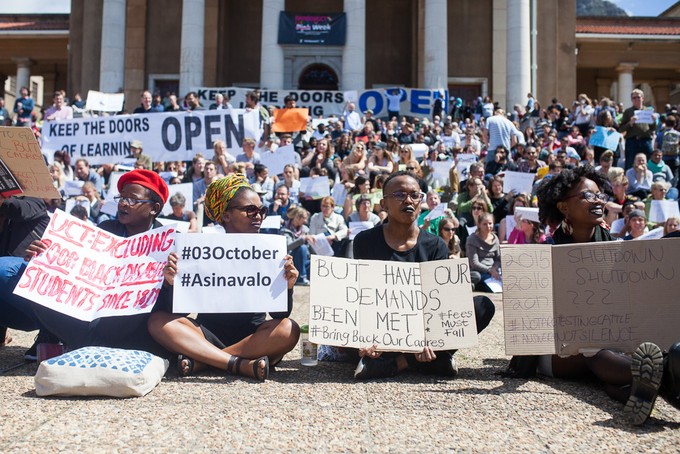UCT academics ask Max Price not to use private security
“The fees announcement by Dr Blade Nzimande … is a regression on last year’s achievement”
This is a letter sent by Dr Lydia Cairncross, a medical doctor at the University of Cape Town (UCT), and 34 other members of the Faculty of Health Sciences, to vice-chancellor Dr Max Price.
We are writing to you, as staff within the Faculty of Health Sciences, to state our opposition to the use of private security to secure the reopening of UCT on Monday 3 October 2016. This option was put forward in your input to the Faculty last Friday.
We believe that this approach is unjustifiable, dangerous and counter to any real attempt to rise to the responsibility of leadership during this crisis in higher education.
The student protests at UCT take place within a national social and political context. They are framed around the legitimate demand for equitable access to a higher education system that also reflects the South African and African context in which we are situated. This is a time when the disconnection between the narrative of a new South Africa for all, and the reality of an unequal, unjust and racist reality both in our broader society and here at UCT, is being exposed. The national student movement is articulating this truth and placing it on the national agenda through the specific demand for free, decolonized education.
The struggle for free education, including higher education, has been ongoing in our country’s history and in its current iteration began more than eighteen months ago. It was only paused after a compromise of no fee increases for 2016 was reached. The fees announcement by Dr Blade Nzimande in September this year not only fails to take us closer to free higher education, it is a regression on last year’s achievement. Trying to paper over the cracks this year by forcing a return to classes will only result in an annual conflagration at the same time every year. Only a real commitment by government to free higher education can provide any lasting stability for the academic project. Vice Chancellors throughout the country will need to carefully consider where they position themselves on this issue or risk the continued view that they represent the interests of the state and corporate sector on the issue of the commodification of education.
With regard to the demand to bring back our cadres, we call on you to take bold and wise leadership on this issue. From student reports, open and honest engagement has not happened. Rather the matter has been deferred to a Senior Executive Task Team which has no real power. UCT’s criminalization and lack of proper engagement with these students is in effect holding the entire university community to ransom. This is jeopardising the teaching, learning, and research which should be happening at the university. We urge you to personally open lines of communication in good faith, so that these students may come back to university on a principled basis.
Our view is that addressing these core underlying reasons for student struggles should be the focus of our collective efforts rather than trying to resume business as usual at any cost.
And those costs could be considerable. A university cannot function as a space for the generation and dissemination of knowledge in a climate of militarization. It is not possible to teach properly when we have armed guards at the door to “protect” us from our students. We cannot expect students to learn or to engage in meaningful debate when armed guards polarize them into groups ‘for’ or ‘against’ a particular struggle. In the best case scenario, using force of arms to open the university will be counterproductive to the stated aim of protecting the academic project which cannot meaningfully take place in this context. In the worst case scenario, it may result in bloodshed and lives lost or destroyed on all sides. Returning from this to any semblance of a university community will be nigh impossible.
Finally, as teachers, we reject the notion of teaching within the shadow of armed guards. If our universities, the institutions of higher learning, the very home and space of ideas and intellectual discussion, cannot find a better solution to our problems than armed guards then we have failed as an institution of higher learning for we are teaching that force, not thought, is the only way to resolve our differences. We say no to private security in our name.
Times of social upheaval and change call for creative and imaginative leadership, we urge you to rise to that challenge.
Views expressed are not necessarily GroundUp’s.
Support independent journalism
Donate using Payfast

Don't miss out on the latest news
We respect your privacy, and promise we won't spam you.
© 2016 GroundUp. 
This article is licensed under a Creative Commons Attribution-NoDerivatives 4.0 International License.
You may republish this article, so long as you credit the authors and GroundUp, and do not change the text. Please include a link back to the original article.

